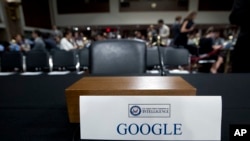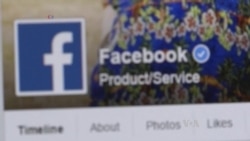Facebook and Twitter executives insisted at a Senate hearing Wednesday that they were aggressively trying to identify foreign actors who wanted to inflict damage on the U.S. before the November midterm elections.
Facebook Chief Operating Officer Sheryl Sandberg told the Senate Intelligence Committee her company was "now blocking millions of attempts to register false accounts each and every day" and was "making progress on fake news."
She said the company's recent efforts were "starting to pay off" but added, "We cannot stop interference by ourselves."
Sandberg said Facebook was "working with outside experts, industry partners and governments, including law enforcement, to share information about threats and prevent abuse" to avert further interference in American elections.
Social media companies are under pressure over foreign meddling in U.S. elections, the spread of disinformation, privacy and censorship. Congress has criticized social media companies during the past year as it became clear they were on the front lines during Russia's interference in the 2016 elections and beyond.
WATCH: Facebook, Twitter, Step Up Defenses Ahead of Midterm Election
Special counsel Robert Mueller indicted 12 Russians earlier this year on charges stemming from plans to disrupt the 2016 election by creating bogus accounts that circulated divisive issues on social media. The indicted Russians are members of the GRU, a Russian Federation intelligence agency.
Twitter Chief Executive Officer Jack Dorsey said that his company was "unprepared and ill-equipped" for the foreign influence campaigns but that it had intensified its efforts to eliminate phony accounts to prevent "hostile foreign influence."
"We're identifying and challenging 8 million to 10 million suspicious accounts every week, and we're thwarting over a half-million accounts from logging into Twitter every single day," he said.
Dorsey also said Twitter was continuing to find accounts that might be linked to the Russians, noting that 3,843 accounts had been suspended and that the company had seen recent activity.
Google’s parent, Alphabet Inc., refused to send its top executive to Wednesday's hearing, prompting sharp words from some senators for Alphabet CEO Larry Page. Senator Marco Rubio, a Florida Republican, suggested the company might have bailed because it was “arrogant,” while Senator Susan Collins, a Maine Republican, expressed outrage about the absence.
Intelligence Committee Vice Chairman Mark Warner said at the hearing that social media giants "were caught flat-footed by the brazen attacks on our election" and expressed doubt that the companies were adequately confronting the problem.
"I'm skeptical that, ultimately, you'll be able to truly address this challenge on your own," Warner said. "Congress is going to have to take action here."
Despite such skepticism from lawmakers, a key U.S. military official said Wednesday that he was encouraged by the actions companies like Facebook and Twitter had taken in advance of the midterm elections.
"This is where social media companies can impose a cost against our adversaries," U.S. Cyber Command's General Paul Nakasone told a security conference in Washington. "This is an ability that I think, uniquely, they are stepping up to."
Nakasone, who also heads the National Security Agency, also said he was not prepared to give up on companies that have been hesitant to take action, calling continued engagement critical.
"We can't run from it. We can't hide from it," he said, warning that adversaries like Russia and even nonstate actors "continue to have an ability to up their game."
While Congress has forced social media companies during the past year to focus more on the Russian interference issue, it took several months last year for Facebook and Twitter to acknowledge they had been manipulated.
Many social media companies have made policy changes that caught and banned numerous malicious accounts during the past year. But free services that find out as much about users as possible remain unchanged, prompting critics to say social media companies will continue to contend with bad actors manipulating their systems unless they change.
Facebook CEO Mark Zuckerberg acknowledged in a Washington Post opinion piece on Tuesday that his company found out too late in 2016 there were "foreign actors running coordinated campaigns to interfere with America's democratic process."
He said the company had since made improvements, such as "finding and removing fake accounts" and misinformation.
But Zuckerberg warned that Facebook and other social media companies faced "sophisticated, well-funded adversaries who are getting smarter over time, too. It's an arms race, and it will take the combined forces of the U.S. private and public sectors to protect America's democracy from outside interference."
Over the past year, three-fourths of all Facebook users have adjusted their privacy settings, taken weeks-long breaks from the platform or deleted Facebook apps from their cellphones, according to a Pew Research Center survey.
The survey was conducted May 19-June 11, after revelations that the former consulting firm Cambridge Analytica had gathered data on tens of millions of Facebook users without their knowledge.
House hearing
Later Wednesday, Twitter's Dorsey was headed to a House committee hearing focused on Republican complaints that social media companies have shown evidence of bias against conservatives. In testimony released before that hearing, Dorsey denied that Twitter uses political ideology to make decisions.
Some Republicans have contended that Twitter is “shadow banning” some in their party because of the ways search results have appeared. Twitter has rejected the assertions.
Dorsey was the lone invitee to the House hearing. While all three tech companies have been accused of being biased against conservatives, the more public-facing nature of Twitter has made it an easier target.
VOA National Security Correspondent Jeff Seldin contributed to this report. Some information for this report came from The Associated Press.










